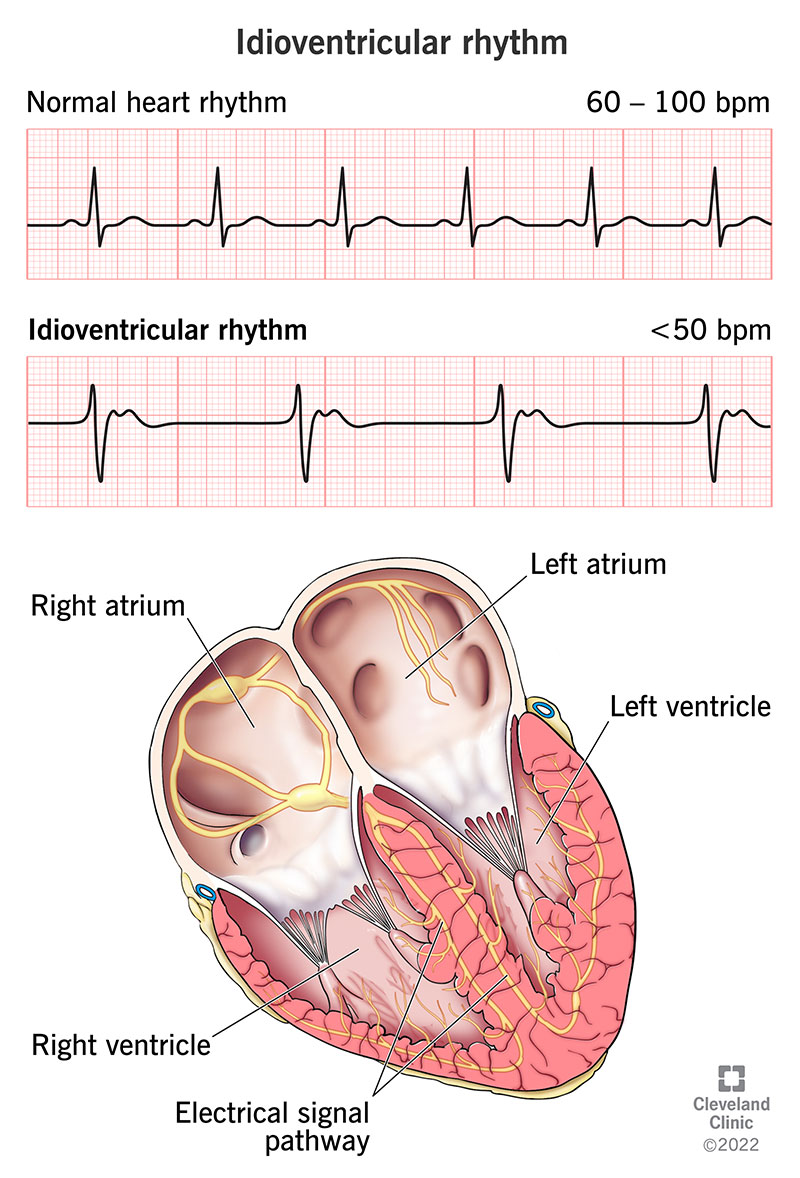Idioventricular rhythm usually stops on its own and you don’t need treatment for it. However, if your heart palpitations don’t stop and you get lightheaded, you may need medicine. Other options include a procedure to get your heart rhythm back to normal and an ablation to prevent abnormal electrical signals.
Advertisement
Cleveland Clinic is a non-profit academic medical center. Advertising on our site helps support our mission. We do not endorse non-Cleveland Clinic products or services. Policy

Image content: This image is available to view online.
View image online (https://my.clevelandclinic.org/-/scassets/images/org/health/articles/23070-idioventricular-rhythm)
Idioventricular rhythm is a heart rhythm in which your lower heart chambers beat more slowly than normal. With this type of rhythm, your heart’s ventricles or lower chambers may start your heartbeat if your natural pacemaker located in the upper chambers is unable to pace the heart.
Advertisement
Cleveland Clinic is a non-profit academic medical center. Advertising on our site helps support our mission. We do not endorse non-Cleveland Clinic products or services. Policy
Unlike ventricular tachycardia, which is faster than 100 beats a minute, idioventricular rhythm is less than 50 beats per minute. An accelerated idioventricular rhythm has a rate of 50 to 110 beats per minute.
Both of these rhythms start in the wrong part of your heart, but they’re in different places.
Idioventricular rhythm starts in your ventricles or lower chambers. Junctional rhythm begins at the junction of your upper and lower heart chambers.
Idioventricular rhythm can affect people who:
Although athletes and others without heart disease can get accelerated idioventricular rhythm, many people with this abnormal rhythm may also have:
Usually, people with idioventricular rhythm don’t have any symptoms. If they do, they include:
Causes of accelerated idioventricular rhythm include:
Advertisement
Your healthcare provider will do a physical exam and ask you about your medical history and your family’s medical history.
They may use these tests to find out if you have idioventricular rhythm:
For most people, idioventricular rhythm is benign (harmless) and you don’t need treatment for it. To treat it, your healthcare provider may take care of the cause, such as:
If the accelerated idioventricular rhythm isn’t going away and your blood pressure drops, your healthcare provider may do one of the following to get your normal rhythm back:
For most people, idioventricular rhythm is harmless and goes away without treatment. However, if you’re fainting and your rhythm isn’t going back to normal, you should get treatment.
Most cases of idioventricular rhythm aren’t harmful, but you may be able to reduce your risk in these ways:
In most cases, you don’t need to do anything for idioventricular rhythm. It’ll go away by itself. You should contact your healthcare provider if your idioventricular rhythm doesn’t go away on its own and you have a fainting spell.
Call 911 if you think you could be having a heart attack.
Although idioventricular rhythm is usually not a cause for concern, other types of abnormal heart rhythms are. If you have heart palpitations and get lightheaded, check with your provider right away. If your treatment involves starting or stopping medication, be sure to follow your provider’s instructions. It’s also important to go to all of your follow-up appointments.
Advertisement

Sign up for our Health Essentials emails for expert guidance on nutrition, fitness, sleep, skin care and more.
Learn more about the Health Library and our editorial process.
Cleveland Clinic’s health articles are based on evidence-backed information and review by medical professionals to ensure accuracy, reliability and up-to-date clinical standards.
Cleveland Clinic’s health articles are based on evidence-backed information and review by medical professionals to ensure accuracy, reliability and up-to-date clinical standards.
When your heart rhythm is out of sync, the experts at Cleveland Clinic can find out why. We offer personalized care for all types of arrhythmias.
